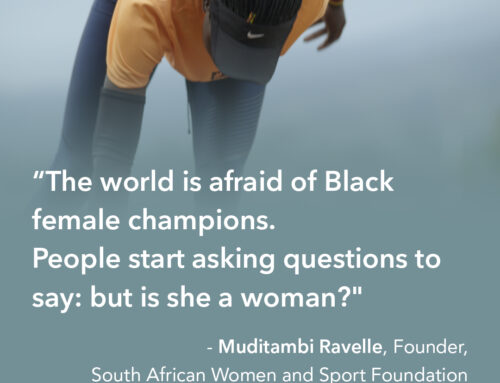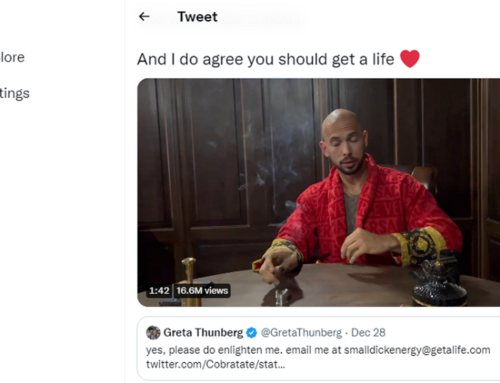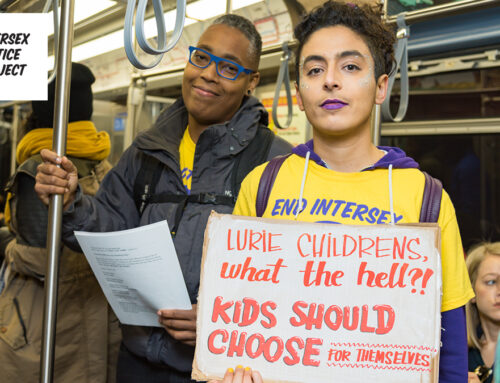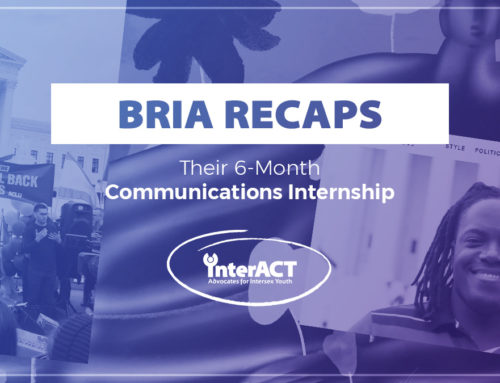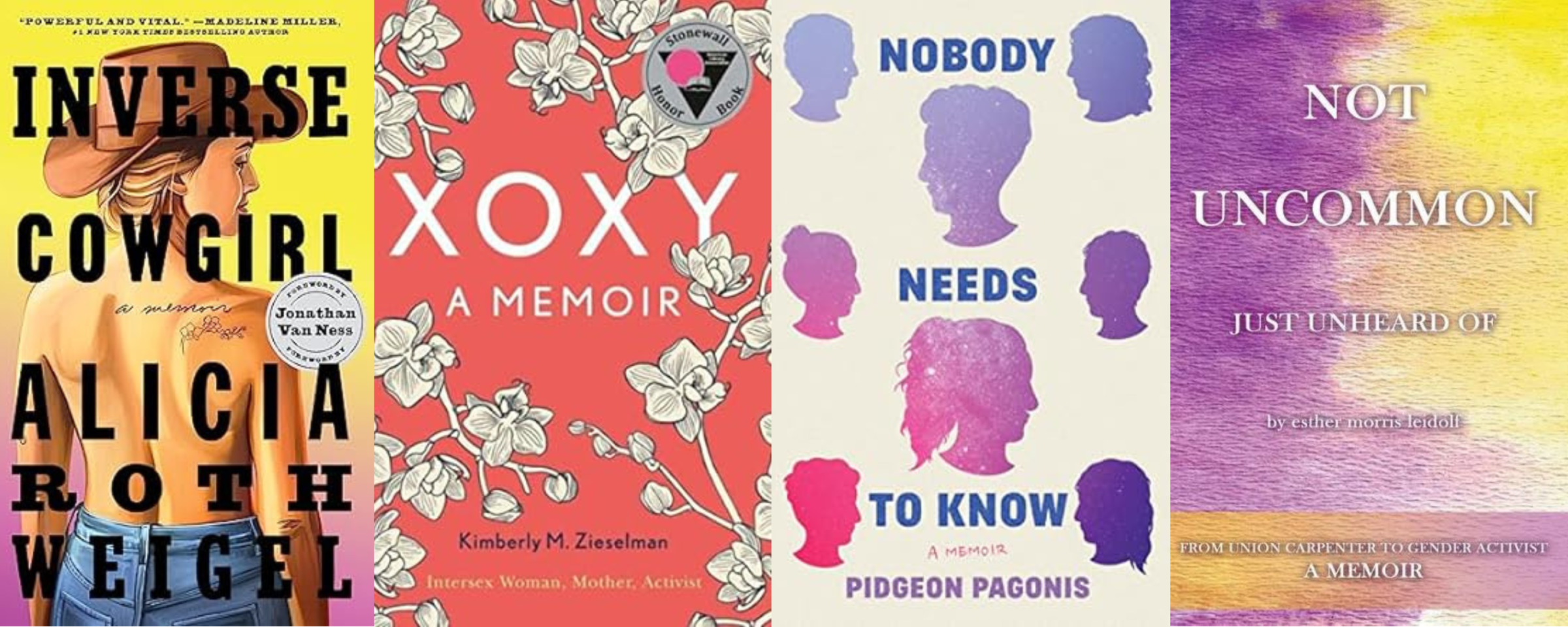
interACT staff Maddie Moran and Marissa Adams share the must-read memoirs of 2023.
Maddie: When I was growing up, there weren’t many books in the world with stories like mine. The moments in which I recognized my life through reading were some of the most pivotal, such as finding a character who also had obsessive-compulsive disorder in Kissing Doorknobs back in middle school. I later recognized my own intersex identity in an article by one of the authors featured here: Esther Morris Leidolf’s 2000 piece titled “The Missing Vagina Monologue”
I had the privilege of reading four memoirs by intersex writers this summer, written because the books these authors needed didn’t exist. The moment we can recognize ourselves in others’ stories, a small piece of our loneliness, shame, and isolation from the world vanishes. If you see glimpses of yourself, your friends or loved ones in these memoir highlights: I encourage you to grab a copy and explore deeply into the beautiful lives explored here.
Marissa: I learned so much from these memoirs. Not only do they expose the truths of what intersex people often experience, but each of these books gives readers a look into the unique lives of each author and their role in intersex advocacy. Many of these writers, like so many intersex people, had medical procedures that we were previously unaware of and faced the psychological distress of that realization often decades later. However, each memoir also describes being inspired by other intersex people (and devoted allies), reclaiming bodily autonomy, and using past experiences to be exceptionally resilient change-makers.
Just ten years ago, there were no intersex memoirs. Now, thanks to Kimberly, Pigeon, Esther, and Alicia, intersex people, family and friends of intersex people, allies, and anyone who wants a glimpse into the lives of an intersex person can pick up one of these books. For some intersex people, there can be a feeling of “being the only one,” and these books prove the opposite.
Nobody Needs to Know
Nobody Needs to Know begins as its title hints: Pidgeon Pagonis shares a vulnerable narrative of a childhood in secrecy due to their intersex traits. Unaware of what made them different, they grew up in a struggle to fit into the traditional notions of girlhood and womanhood surrounding them. Through self-discovery of queer and intersex identities, Pidgeon launched themself into the role of a bold activist and leader in the intersex community.
Often the contributions of intersex people of color are under-recognized, and a key moment of the book is the successes Pidgeon champions along with Sean Saifa Wall through the Black and Brown led Intersex Justice Project. There’s plenty of intersex joy to be found in watching the take-down of the abuse practices of the major children’s hospital that had haunted Pidgeon since childhood. For all that this memoir doesn’t hold back on the wounds from growing up intersex, it also offers fulfilling stories of personal growth and political justice through Pidgeon’s dedication to righting the world for intersex kids.
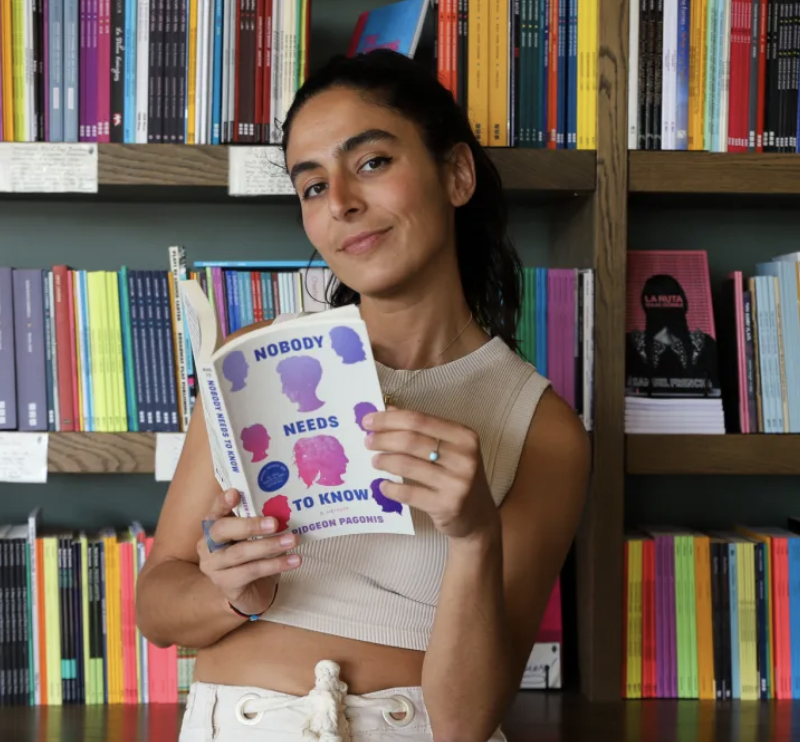
Credit: Amber Stoutenborough/Block Club Chicago
A highlight
Pidgeon carries deep respect for intersex people in each page—how activists or not, each one of us have made a mark on the world just by existing. They write, “There have always been intersex people. Silently existing, scared and forced to live in the shadows. But the fight didn’t begin with IJP, or InterACT, or even ISNA. Like a supernova, it started a long time ago, when the first intersex people were born and survived and made their marks on the world, and only now are we beginning to see the light from those earlier explosions. The cumulative ruptures of all these acts of resistance are reaching through space-time and being felt today.”
What do you hope other intersex people or allies will take away from your memoir?
“I hope to inspire other people to not only never give up on the movement but to never give up on themselves. To never forget that there is a light at the end of whatever path you’re on, whatever tunnel you’re in. You can get there. It might look different than it does for other people who aren’t intersex, who have not been robbed of their bodily autonomy, but we can figure it out for ourselves. We are destined to. We deserve that for ourselves.”
Not Uncommon, Just Unheard Of
Author Esther Morris Leidolf has spent decades as an intersex advocate, educator and consultant on MRKH—but her earlier life was vastly different. Her early life is as a union carpenter, a woman in a traditionally men’s trade, defending herself daily and working twice as hard for respect.
When she explores her “mysterious medical situation” from her past, she channels this fierce advocacy to her own medical care, and then the entire community of marginalized people she discovers a connection with. As a self-published title this book hasn’t been featured as much as it truly deserves, and is a critical read for those exploring the medical side of intersex experience.
As Esther says in her recent video, ““Once I learned how expansive sex and gender actually are, shame didn’t haunt me anymore. Because who we are is who we were meant to be. And who we are, is not uncommon. Just unheard of.”
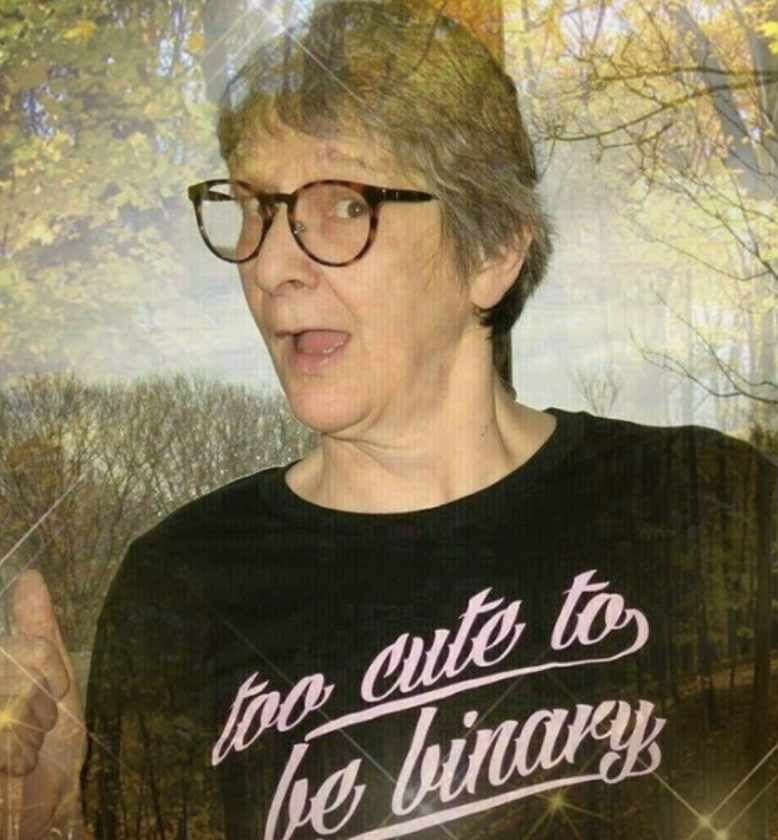
A highlight:
Like too many people with MRKH/intersex variations, Esther was “treated” to become “normalized” but not treated for the health concerns she’d faced—and she offers real reflections on why this abuse persists. “Our diversity challenges the status quo and that makes people very nervous. We challenge the concepts of binary gender and normal sexual activity, which threatens others to their core.”
What do you hope other intersex people or allies will take away from your memoir?
Inverse Cowgirl
Alicia Roth Weigel is both immersed in political activism and featured as a subject of the film Every Body just as she also published a book them magazine has called “The must-read memoir of fall 2023.” With a foreword by Jonathan Van Ness—who we learn in the book she won over and turned an intersex rights advocate by waking up in the middle of the night to be first in line at a free haircut event—it’s easy to be compelled by Alicia’s life story built on conviction and gutsiness.
The surprises in here you might not expect: commentary on navigating the extremes of bipolar disorder, and the healing capacity of hallucinogens.

A highlight:
Alicia’s memoir insists we reclaim our bodies and embodiment, and we witness this through her pages titled by her tattoos. Many intersex people who experience trauma at a young age learn to dissociate. She writes: “Dissociation is a learned coping mechanism many of us share…Embodiment is the opposite of dissociation. It’s literally bringing myself back into my body. I do this through meditative trail running, yoga, snuggling with my dog, Chiquita, and dancing.”
What do you hope other intersex people or allies will take away from your memoir?
“Having seen the word intersex for the first time in a positive context, I can guarantee why I am out now. Had I found the word intersex in a really hyper-medicalized way or a negative context, it would not have given me the motivation to come out myself…I think there’s something huge to be said for sharing intersex joy, because if you can see positive examples of who you are, you’re going to want to reclaim that for yourself. I want to be that beacon—you can be a successful, happy human being, and intersex.”
You can order on Amazon and follow Alicia Roth Weigel on Twitter, Instagram or TikTok.
XOXY: A Memoir
This book makes it on our list (despite being released in 2020) because it truly deserves inclusion here. In XOXY, Kimberly Zieselman talks about her life from before she knew she was intersex in her 40s, to becoming a leading intersex human rights activist (and Executive Director at interACT!) and everything in between. The title alone offers a story behind the letters “XOXY.” Kimberly describes the moment she wrote a social media post to several other members of the InterConnect support group.
Instead of “xoxo” she signed her signature with the now XOXY, the “Y” representing the Y chromosome associated with her intersex variation. Across the intersex community, you will even find “xoxy” tattoos inspired by Kimberly’s signature (including on Marissa’s own ankle!)

A highlight:
Throughout the book, Kimberly’s story and message spell out the human rights issues intersex people face. One of the notable parts of XOXY is when Kimberly participated in a 2015 meeting at the United Nations witnessed intersex education. The now famous BuzzFeed video was screened, featuring interACT board, staff, and Youth members talking about what it means to be intersex. They debunk common myths in a confident manner that centers intersex joy. Kimberly says, “Our video, now playing at the United Nations. I was proud and awestruck. In that moment, and over the two full days there, despite my nervousness about being there with academic and human rights experts from around the globe, my own personal experience as well as the experiences of the other intersex people in the room were not only heard but arguably the most important expertise in the room.”
What do you hope other intersex people or allies will take away from your memoir?
“I wrote this memoir to raise awareness amongst readers who are more “moderate middle” leaning and might be more inclined to absorb the realities of the difficult human rights issues if coming from someone they felt they could identify with a bit … a straight wife and soccer mom living in the suburbs. Of course I am also a bad-ass activist and queer ally, but my story is an opportunity to engage those who might be otherwise turned off and not be able to “hear” the message.”
You can order on Amazon and follow Kimberly Zieselman on Twitter or Instagram.
We hope you take the time to explore these memoirs and see reflections of yourself or others in your life within the pages. Want to get more content like this? Sign up for our mailing list!


